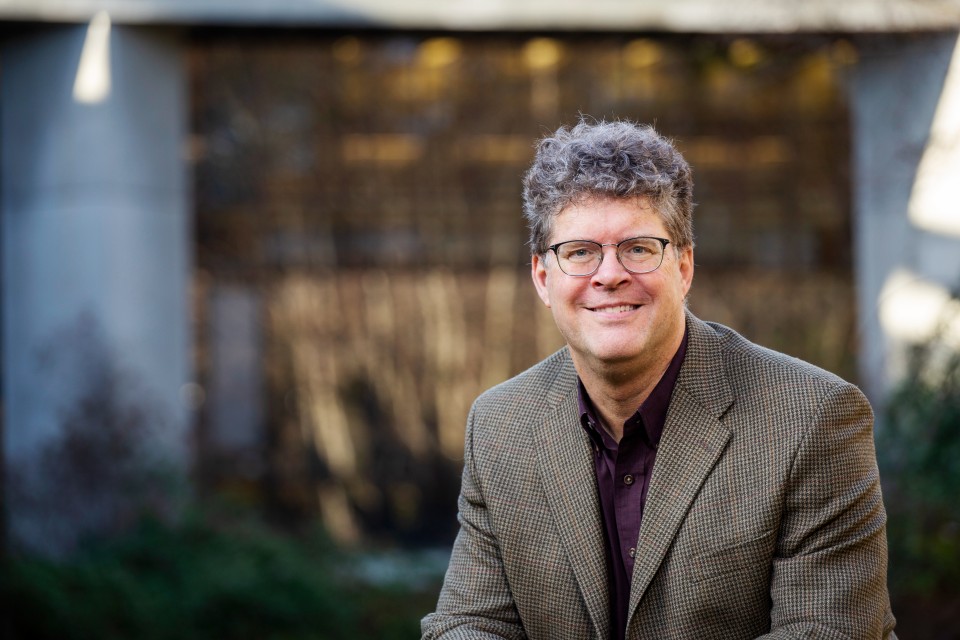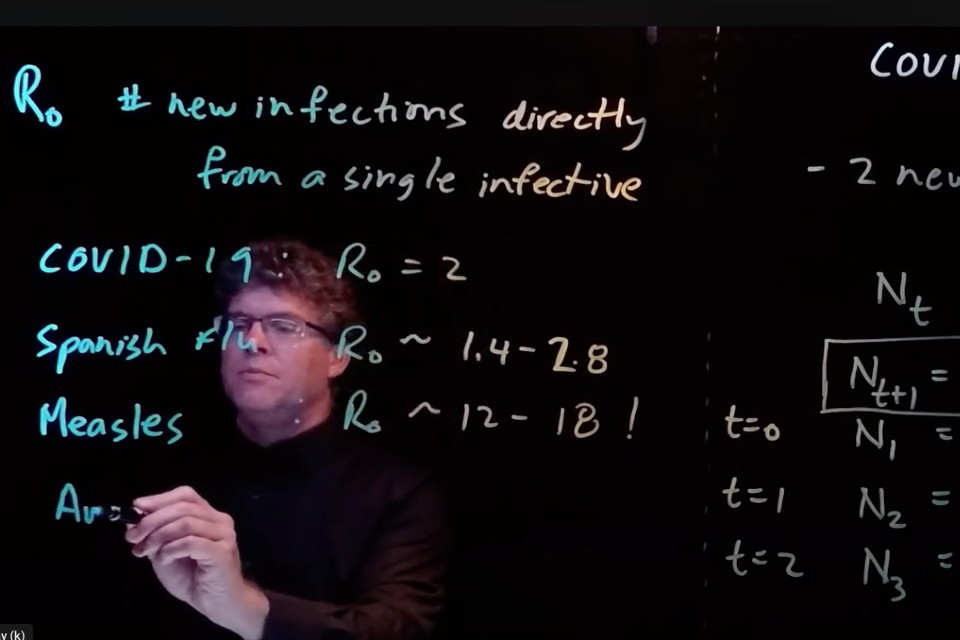Renowned mathematical ecologist Mark Lewis returns as Kennedy Chair
- Sarah Tarnopolsky

From predicting the spread of COVID-19 to protecting polar bears in the wake of climate change, mathematical biology is quickly becoming a vital tool for addressing world problems. During his 30 years in the field, Mark Lewis has been part of its explosive growth. Joining the University of Victoria in 2022 as the inaugural Gilbert and Betty Kennedy Chair in Mathematical Biology, Lewis is well-positioned to strengthen the discipline at UVic, while his numerous research projects continue to have extensive impacts around the world.
“[The field has] grown immensely and I’ve been fortunate to be part of that growth,” says Lewis about this critical intersection between two areas of science. “I think it’s because a lot of the exciting new problems in mathematics are coming out of biology.”
The UVic grad and 2012 Distinguished Alumni Award recipient will be teaching undergraduate students in a new undergraduate offering at UVic that combines biology with mathematics and statistics—a course Lewis wishes had been available when he started his academic journey. A Vancouver Island native with a love of the environment, Lewis enrolled primarily in ecology courses, but quickly discovered an aptitude for mathematics and veered more in that direction. After graduating with his bachelor of science in biology and math/computer science, Lewis earned a doctorate in mathematical biology at Oxford University in the UK. He then spent 12 years in the US before returning to Canada as a Canada Research Chair at the University of Alberta. Over the next two decades, he developed a prolific research program applying mathematics to problems in a wide range of subjects, including ecology, public health and environmental sciences.
“Mathematics is a powerful lens through which we can understand complex processes in biology,” explains Lewis. “It has helped us discover there’s all these connections between, for example, cancer biology and ecology—between a growing tumour and an invasive species. Even though they come from very different places, the equations actually look very similar.”
Applying math to ecological problems
Perhaps owing to his love of the environment, Lewis has been drawn to work on real-world problems caused by humans, including the impacts of climate change, habitat destruction and industrial salmon farming.
His calculations regarding the movement patterns and energy reserves of polar bears helped prove the connection between changing ice conditions (typically driven by climate change) and the productivity of polar bear populations, resulting in the species being added to the IUCN Red List in 2015. He’s applied similar models to data on grizzly bears, wolves, caribou, Amazonian birds and pandas.
Lewis was part of an interdisciplinary team working on two decades’ worth of data collected from the Broughton Archipelago (off the coast of northern Vancouver Island) examining the impact of sea lice from fish farms on wild salmon populations. That research showed that fish farms situated in salmon migration corridors increased the transmission of parasites from the farms to out-migrating juvenile salmon. By the end of 2022, 14 fish farms in the Broughton Archipelago closed.
A different pest, the mountain pine beetle, is an invasive species that causes severe damage to trees in BC and is spreading into Alberta and Saskatchewan. Changing temperatures, caused by climate change, affect the development of the beetle and its reproduction, as well as the resiliency of the trees to the beetles. Lewis is using machine-learning to predict insect outbreaks, informing forest management practices, and ultimately helping save forests.
I get a lot of motivation from working on these [ecological] problems as I find them super interesting. The hope is that we can modify what we do or how we interact with our environment to be better stewards.”
–Mark Lewis

Lewis's classes cover the applications of math biology from epidemiology to ecology. Photo: YouTube
An exciting time for new scientists in the field
Lewis’s first taste of research as an undergraduate student at UVic was working with renowned mathematical epidemiologist Pauline van den Driessche. Almost thirty years later, he was part of a team helping address one of the greatest epidemiological problems of our time—the COVID-19 pandemic. Lewis now leads a network of scientists dedicated to modelling emerging infectious diseases in Canada to assist with developing what’s proven to be a crucial public health tool.
“When a field is growing there is much more opportunity,” says Lewis. “When I train people now, I am training them for emerging opportunities. It’s like riding a wave.”
It’s a wave that needed an anchor at UVic, which is exactly what Peter Loock, the dean of science, was looking for when he hired a chair in mathematical biology at UVic. The creation of a chair position brings a distinguished scholar to the university who will contribute to academic programs through research, teaching and service. This endowed chair position is funded through a $3 million gift from the estate of Betty Kennedy.
“We’re fortunate the generous gift from the Kennedys’ estate has allowed us to bring someone as accomplished and respected as Lewis to UVic,” says Loock. “His passion for teaching the next generation of mathematical biologists, combined with his diverse research portfolio will ensure the Kennedys’ gift will have truly global impact.”
The Kennedy legacy
For Lewis, the chair position was certainly the right opportunity at the right time in his career, and he isn’t shy to admit he’s delighted to be back on Vancouver Island. “I thought it would be fun to try a new set of challenges in a place that I love,” he says.
The funding supports a lab manager and reduced teaching schedule that increases his ability to develop research collaborations and contribute more to the growth of his field while establishing a hub at UVic. Although the name recognition and prestige of the position is important to him, Lewis is primarily motivated by the work itself.
“A lot of people don’t relate to math, but we all care about the environment and how it is changing. Putting these things together is what makes my job really exciting. It’s not purely intellectual. It’s a way of connecting to the world… and using the skills I have to improve things.”
UVic is a catalyst driving change and meaningful impact on a global scale through strong partnerships at home and internationally. In our teaching, research and operations—and through our local, national and international partnerships—the University of Victoria proudly supports and works to advance the United Nation’s Sustainable Development Goals (SDGs). UVic’s commitment to climate, environmental change and sustainability measures up—we are second in the world among universities for climate action as ranked against the SDGs. Learn more about UVic’s 2022 ranking by the Times Higher Education Impact Rankings.


